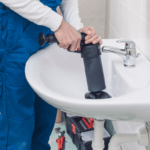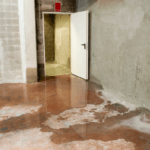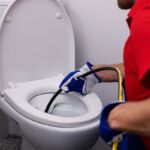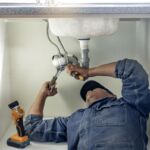
How to Prevent Basement Flooding?
Many households deal with the common and frequently disastrous issue of basement flooding. Whether brought on by persistent rain, melting snow, broken plumbing, or inadequate drainage, basement flooding may have devastating financial and emotional effects.
However, you may reduce the chance of basement flooding and safeguard your property by taking the appropriate preventive steps and taking a proactive attitude. This article looks at a detailed manual on how to guard against basement flooding and prevent water damage to your property.
Tips To Prevent Your Basement Flooding
The following tips will help you have a great time in preventing basement flooding and water damage to your house, read further for detailed methods:
Maintain Gutters and Downspouts
Make sure your gutters and downspouts are in good functioning order as one of the major measures to prevent basement flooding. Water overflow caused by clogged or damaged gutters can accumulate near the home’s foundation and raise the possibility of basement flooding.
Examine and clean gutters regularly, clearing them of leaves, objects, and anything else that can restrict the flow of water. To stop water from leaking into the basement, extend downspouts away from the foundation and send water at least five feet away from your property.
Proper Landscaping & Grading
Your landscape’s grade is very important for preventing basement flooding. To keep water away from the basement walls, the land around your house should ideally slope away from the foundation.
Water can build up around the foundation due to poor grading, which can cause seepage into the basement. If necessary, have the grade evaluated and adjusted by a qualified landscaper or contractor to ensure appropriate drainage away from your property.
Install a Sump Pump System
A sump pump is a crucial piece of equipment that keeps your basement dry by draining extra water that builds up around the foundation. The sump pump is often situated in a pit where water is collected and activates automatically when the water level exceeds a specified level.
Check your sump pump frequently to make sure it is functioning properly, and think about buying a battery backup system to ensure continued operation even during power outages.
Waterproof Your Basement
A proactive strategy to stop water from entering in the first place is to apply waterproofing techniques to your basement. To build a barrier against moisture on basement walls and flooring, think about utilizing waterproofing coatings or sealants.
Additionally, look for any foundation gaps or cracks in your basement and properly seal them. This will shield your home from potential structural damage brought on by water seepage and avoid basement flooding.
Install Window Well Covers
When it rains or snows a lot, basement windows might be access places for water. Window well covers can be installed to create a barrier that stops water from collecting around the windows and leaking into the basement. Window well coverings also ensure improved ventilation and natural light for the basement by keeping debris, leaves, and animals out.
Check and Maintain Plumbing Systems
Unexpected basement flooding can be caused by faulty plumbing. Check the pipes, faucets, and drains in your home’s plumbing system regularly for leaks, obstructions, and wear.
Pay attention to the water pressure and keep an ear out for any strange noises that can point to a potential issue. To avoid water damage to your basement and other areas of your house, fix any problems right away.
Consider French Drains
French drains are a reliable drainage system created to divert water away from the foundation of your house. These drains are made out of underground, gravel- or rock-encircled, soil-covered perforated pipes.
When the foundation becomes clogged with water, it seeps into the perforated pipes and is diverted away from the basement. Installing French drains can help keep your home dry during heavy rains and drastically lower the risk of basement flooding.
Invest in a Backup Power Generator
Power outages during powerful storms are common, and if your sump pump depends only on the electrical grid, it could cause it to stop working.
Purchasing a backup generator guarantees that crucial appliances, such as the sump pump, keep working even during power outages, preventing basement flooding continuously.
Install Basement Flood Alarms
Specialized tools called basement flood alarms can measure the water levels in your basement. When water starts to leak into the basement, these alarms serve as an early warning system and let you know.
Installing flood alarms enables you to respond quickly to the problem before it develops into a major flooding incident. You may receive real-time notifications no matter where you are by connecting some high-tech flood alarms to your smartphone.
Elevate Electrical Outlets and Appliances
The risk of basement flooding to basement-located electrical outlets and appliances is significant. Elevate appliances like water heaters, furnaces, washers, and dryers above any potential water level, including electrical outlets, circuit breakers, and other appliances.
Through this precaution, flooding-related electrical risks and harm to important household appliances can be reduced.
Create a Green Roof or Rain Garden
An eco-friendly and visually beautiful solution to stop basement flooding is a green roof or rain garden. Growing plants on your roof, known as a “green roof,” absorb and hold onto rainwater, thus lowering the overall runoff that may end up in your basement.
In a similar vein, rain gardens are landscaped spaces created especially to catch and absorb rainwater. Rain gardens and green roofs both help manage stormwater and stop basement flooding.
Regularly Inspect and Maintain Foundation Walls
To prevent water from entering your basement, the integrity of your foundation walls is essential. Regularly inspect your property to look for any cracks, leaks, or indications of structural damage.
Repair any problems discovered during these inspections right away to increase the stability of the foundation and stop water intrusion.
Consider Exterior Drain Tile Systems
Buried pipes that are built around your home’s foundation make up exterior drain tile systems. By gathering extra water and rerouting it away from the foundation, these pipes reduce the possibility of basement flooding.
Exterior drain tile systems offer an additional degree of security, even if interior drain tile systems are more frequent, particularly in regions with a lot of rainfall.
Educate Family Members and Practice Preparedness
Inform your family members about the dangers of basement flooding and the appropriate precautions. Everyone should be aware of where the key utility connections are located and how to turn off the main water supply in case of an emergency.
Create a family emergency plan and periodically practice it to ensure that everyone is aware of what to do in case of a flood or other water-related event.
In Conclusion
A proactive strategy and routine maintenance of your home’s drainage and plumbing systems are required to prevent basement flooding. You may considerably lower the likelihood of basement flooding and guard your house against water damage by putting the preventive steps covered in this thorough guide into practice. Keep in mind that the secret to protecting your home’s structural integrity and keeping your basement dry is being proactive and ready.
Are you concerned about the risk of basement flooding in your home or commercial property? Tap Tech is here to help you stay ahead of the game with our expert prevention tips and solutions! Basement flooding can cause extensive damage, disrupt your life, and lead to costly repairs. Don’t wait for disaster to strike – take proactive measures to safeguard your property with the guidance of Tap Tech.
Contact us today to schedule a consultation and secure your property’s safety. Together, let’s create a flood-resistant space that ensures peace of mind and protects your investment for years to come!









